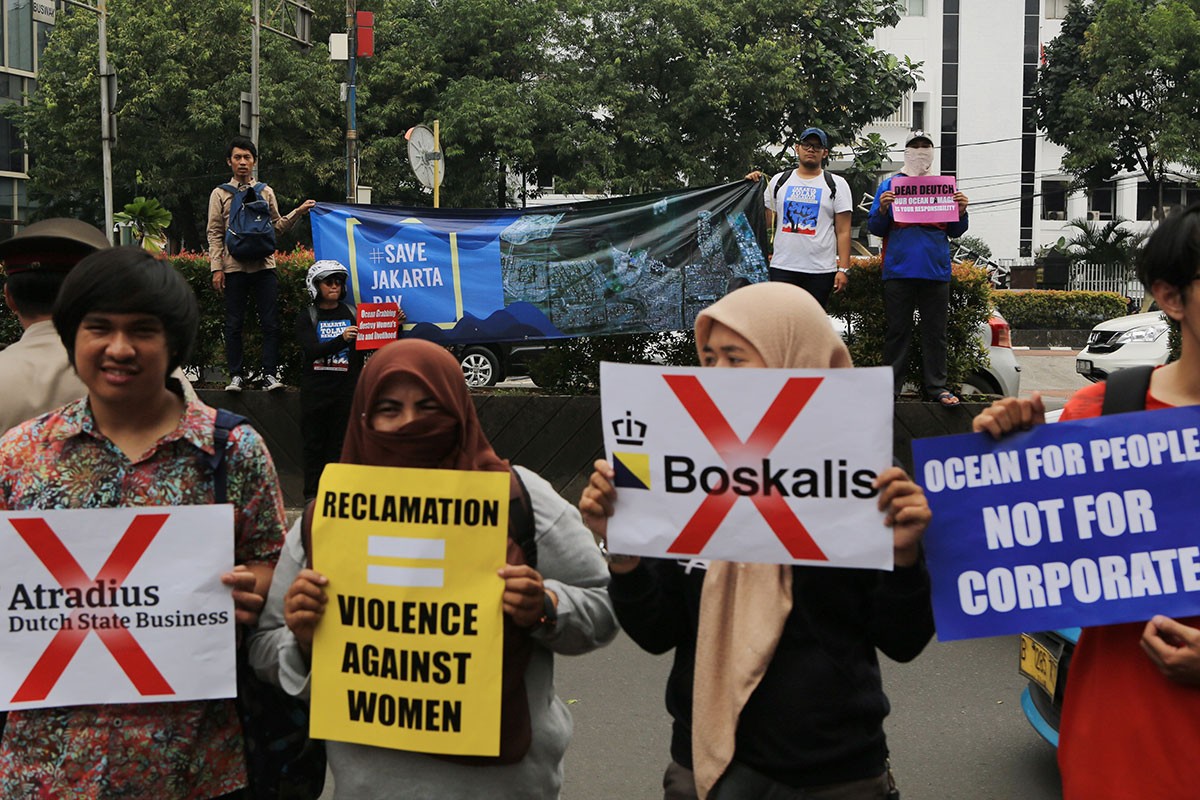Popular Reads
Top Results
Can't find what you're looking for?
View all search resultsPopular Reads
Top Results
Can't find what you're looking for?
View all search resultsAnies, Jokowi and the fateful Jakarta Bay
The reclamation issue is not about Anies, Jokowi or their political parties. This is about how Jakarta survives and continues to progress.
Change text size
Gift Premium Articles
to Anyone
 Students and fishermen of Jakarta Bay Participate in a protest infront of the Netherland Embassy in Jakarta, Wednesday, November 23, 2016. On that protest they asked the dutch government to stop participating in National Capital Integrated Coastal Development (NCICD) or Reclamation of the Jakarta Bay which considered detrimental to their livelihoods. (JP/Seto Wardhana.)
Students and fishermen of Jakarta Bay Participate in a protest infront of the Netherland Embassy in Jakarta, Wednesday, November 23, 2016. On that protest they asked the dutch government to stop participating in National Capital Integrated Coastal Development (NCICD) or Reclamation of the Jakarta Bay which considered detrimental to their livelihoods. (JP/Seto Wardhana.)
J
akarta is on the brink of another new era. In the April run-off, the majority of residents elected contender Anies Baswedan-Sandiaga Uno, who contested for the first time, proving how voters are hungry for progress and change not only for themselves, but the city they live in.
The same force of democracy catapulted Joko “Jokowi” Widodo, then also a political novice in the city, and Basuki “Ahok” Tjahaja Purnama to the top post in the capital five years ago. They had brought development marvels that once could only have been imagined: cleaner rivers, hundreds of public parks and a trusted bureaucracy.
But how many changes are too many?
Democracy can also harm progress. This is because, as economist Bryan Caplan wrote in The Myth of the Rational Voter: Why Democracies Choose Bad Policies, voters suffer biases in making choices, such as anti-market and anti-foreign sentiments because they tend to opt for candidates who adhere to their own interests, rather than the greater good. When unemployment rates are high, people will vote for those who promise job creation and restrictions on foreign workers.
Voters also have a short attention span, making them prey to false and empty campaign promises because they will vote for a candidate who echoes their fears and worries.
This is what Americans have to endure today. United States President Donald Trump, who had mined rage on economic downturn to win the election, just issued an executive order to withdraw crucial subsidies to insurers that help people get affordable health care administered by former president Barack Obama’s Affordable Care Act (ACA), popularly known as Obamacare.
Now millions of Americans are under threat of losing their healthcare protection.
As a democracy that has only experienced direct elections since 2004, Indonesia, and particularly Jakarta, still benefits from the process.
Elected regional leaders have proven that they have accelerated development and progress that have brought prosperity in their regions. Many free health care and free education programs were commissioned by local leaders who were eager to please their constituents.
There are setbacks too. Many have been sent to jail for corruption, while others have introduced reckless policies that propel deforestation, haze and other environmental degradation.
In fact an election only offers voters the door to welfare therefore accountable leaders are the key to making it happen. What can correct the voters’ biases are trusted leaders who base their policies on sustainable values to assure that all elements of society can benefit from their decisions in the long run.
A leader should avoid divisions of the rich versus the poor, corporations versus people, or the majority versus the minority in making a decision because people oftentimes opt for irrational choices and corporations can be blinded by the lure of profit. A regulation should be weighed based on how it would benefit society as a system and how much economic and social costs it incurs in the short and long terms.
The private sector is not always efficient in carrying out development, especially when it requires huge investment and has to cover a lot of people. And as the country is gearing up for infrastructure and development, cases where myopic decision-making in the name of pro-business often end up as catastrophic.
One reckless step, such as burning peat forests or well drilling without careful planning, is enough to harm society.
Congratulations and well wishes abound for Anies and Sandiaga who were democratically elected to lead the city. But from now on, not only do they have to work hard to fulfill their promises to voters, they should also learn how to waltz around the central government and political parties who also demand them to serve their interests.
The litmus test that both Anies and Sandi will face is addressing the controversy of the Jakarta Bay reclamation that poses political and environmental risks to them.
The central government has ordered resumption of the project despite unsettled environmental violations on Islet G that has disrupted the operations of a nearby gas storage facility and a coal-fired power plant (PLTGU) in Muara Karang.
Anies and Sandiaga, who have been supported by the opposition parties, have insisted on stopping the reclamation project to protect the livelihood of the fisher folk. But the stake is actually higher, because the poor planning of Islet G has endangered the power plant and gas facility.
Now the fate of Jakarta Bay rests in the hands of the central government and the Jakarta administration under Anies. Whatever the decision, it should go beyond political rivalry, public clamor and short-sighted planning that only benefits a certain group or two.
The reclamation issue is not about Anies, Jokowi or their political parties. This is about how Jakarta survives and continues to progress.









